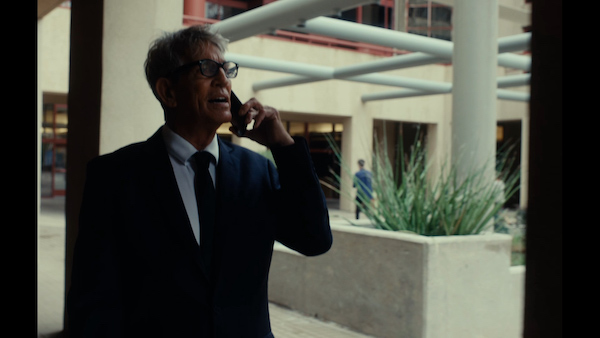
Based on real-life events, Protocol 7 uses staged re-enactments to make the case that pharmaceutical giant Merck doctored test results to sell potentially dangerous mumps vaccine. Director and co-writer Andy Wakefield tackles an important story, but tells it with little finesse and less clarity.
During a business meeting in a corporate conference room, Dr. Errani (Eric Roberts) warns Stone (Alec Rayme) that if results for the company’s MMR mumps vaccine don’t improve, the FDA will not approve the drug. Stone in turn tells lab rat Kirk (Harrison Tipping) to do anything necessary to get better scores.
Schilling (Josh Murray), a former Merck employee, approaches disgraced Dr. Jay (Matthew Marsden) at an alternative health convention. Schilling hands over stolen lab records that prove Merck has been lying about its MMR vaccine. Jay overcomes his initial reluctance to compile a compelling case against Merck.
It takes lawyer Lexi Koprowski (Rachel Whittle) to bring the case to the next level. Unable to bear children herself, Lexi and her husband Josh (R. Brandon Johnson) adopt Ishal (Christopher Robert Scott), an at-risk child from Africa. A series of vaccine shots render Ishal autistic.
Searching for answers, Lexi learns about the Merck lab reports from Jay. It will take many setbacks and reversals until Lexi and her legal team confront Merck officials in a deposition.
Getting to that point requires swirling time and plotline shifts that make the story unnecessarily confusing. It doesn’t help that the screenwriters can’t name names due to sealed evidence in ongoing lawsuits. Merck is the only entity to come under fire. The characters are amalgams, not real people. The villains in particular are drawn with very broad strokes.

That said, Whittle makes a sympathetic protagonist, seemingly out of her depth until the final legal scenes. It’s during the depositions that Protocol 7 comes alive, with Eric Roberts giving a master class in obfuscation as an executive trying desperately not to be pinned down.
Until that scene, Protocol 7 is a series of disconnected glimpses of failing marriages, bad medical decisions, and montages of lab procedures. Viewers are never quite sure who the characters actually are or what they do. It’s not even clear where or when the story is taking place.
It’s easy to fault the fractured editing, the off-center photography, the poor performances, and the obscure screenwriting. However, there is a more fundamental flaw to Protocol 7.
Wakefield and his team skirt the issue of whether or not they are pro- or anti-vaccine. Like The China Syndrome, Protocol 7 wants to blame corporate corruption for a grave injustice instead of examining how that injustice came to be. Unfortunately, the tone of the film and the way its characters are portrayed are overwhelmingly anti-vaccine. At the same time, the filmmakers pretend they’re not anti-vaccine, just against the illegal, deadly ones. (Just like The China Syndrome wasn’t against nuclear power plants, only the ones that threatened to explode.) Hard-core anti-vaxxers can’t make that distinction.
Credits
Directed by Andy Wakefield. Written by Andy Wakefield, Terry Rossio. Produced by Joey Vasatka, Brian Wendel, Darren Lutz, Tina Lutz. Executive producers: Marcel Jahnke, Andy Wakefield. Cinematographer: Jordan Bogart. Production designer: Bill Swang. Original score by Will Taylor. Cast: Rachel Whittle, Matthew Marsden, Josh Murray, R. Brandon Johnson, Eric Roberts, Alec Rayme, Harrison Tipping, Christopher Robert Scott.
Distributed by Abramorama. Currently streaming. Photos courtesy Abramorama.


